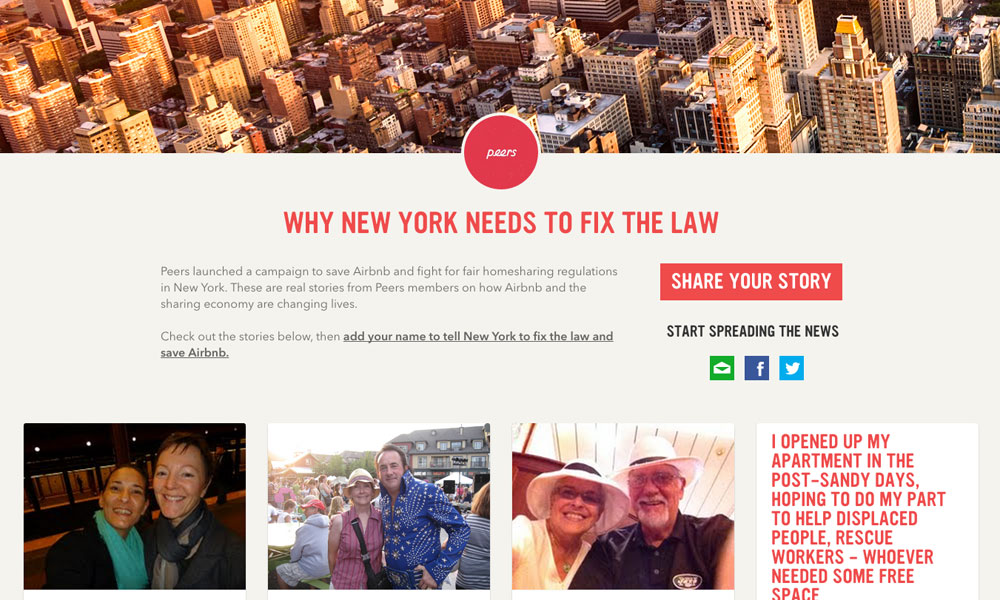
Share and Share-Alike: A “Sharing Economy” Nonprofit Builds Steam
With "sharing economy" companies such as Airbnb and Lyft under increasing scrutiny, it was only a matter of time before an industry advocate came along. That advocate, Peers, is drawing attention—good and bad—for its grassroots-style techniques.
With “sharing economy” companies such as Airbnb and Lyft under increasing scrutiny, it was only a matter of time before an industry advocate came along. That advocate, Peers, is drawing attention—good and bad—for its grassroots-style techniques.
With the rise of companies like Airbnb, which connects travelers with people renting homes and apartments, the way we share with others has evolved in fascinating ways. So it only makes sense that the nonprofit advocacy group for the budding industry, Peers, is focused on bringing together a crowd.
But not everyone is a fan of the association’s approach, and some question how truly grassroots it is. More details below:
We no longer live in a binary space of business versus the grassroots. Businesses can be part of social change, just like nonprofits.
About Peers: The membership-based nonprofit, which mixes grassroots advocacy with business interests, intends to encourage the rise of the “sharing economy,” exemplified by modern business techniques such as crowdfunding, peer-to-peer rentals, and ride-sharing. The Peers corporate members—which include well-known startups such as Chegg (textbook rental), Lyft (ride-sharing), and TaskRabbit (errand-running)—are joined by nonprofit organizations that share similar missions, such as the Sustainable Economies Law Center and the Global Transition to a New Economy. Peers, which launched last summer, has already scored one lobbying victory—an effort to legalize ride-sharing in California.
The latest front: Currently, Peers is taking its efforts to New York, where Airbnb is facing difficulties due to a state law designed to crack down on illegal hotels in New York City. The law, which bars rooms from being rented for less than 30 days, has put pressure on both the company and individual Airbnb renters. As a result, Peers launched a Tumblr-based campaign encouraging both renters and hosts to speak out and call for changes to the law. “I believe AirBnB has become an integral part of NYC tourism and should be encouraged,” wrote one renter. Another noted that the service makes it affordable to live in one of the world’s most expensive cities. The campaign involves a petition styled after those on Change.org. Peers also has focused on its ground game with canvassing campaigns and social media approaches.
Real turf or astroturf? Peers’ tactics have raised questions from some organizations, due in part to its close ties to Airbnb (the company’s community manager, Douglas Atkin, is the cofounder of Peers) and the Omidyar Network (an investment firm launched by eBay founder Pierre Omidyar). While cofounder and Executive Director Natalie Foster defended the organization’s approach in a Fast Company article, that same article raises questions about the way the organization formed. Foster (whose background includes work on the Obama campaign’s grassroots group Organizing for America) was brought in to launch Peers by Purpose, a consulting firm designed to build social movements, Fast Company notes.
Foster says that despite how she came aboard at Peers and who its backers are, the organization’s agenda is open and will be defined by its members. “We no longer live in a binary space of business versus the grassroots. Businesses can be part of social change, just like nonprofits,” she told the magazine. “This space between social benefit and economic benefit is where the sharing economy is growing fast.”
Peers recently launched a Tumblr-based campaign to fight a law seen as damaging to Airbnb. (Peers screenshot)






Comments